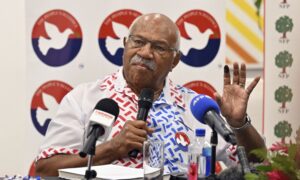Fiji’s New Leader Scraps Police Training Deal With China, Fires Top Cop
Fiji’s newly elected leader said on Thursday that the Fijian security force would cease working with personnel from China, signaling the end of a policing agreement signed between the two nations in 2011. Prime Minister Sitiveni Rabuka, who took office in December 2022, deemed it unnecessary for the Pacific Island nation to continue its policing agreement with China given the “differences” in their respective systems. “Our system of democracy and justice systems are different, so we will go back to those that have similar systems with us,” Rabuka was quoted as saying by Fiji Times. The former Colonel said that Fijian security forces would instead work with personnel from Australia and New Zealand, who he believes have systems comparable to Fiji. The Fiji Police Force and China’s Ministry of Public Security signed an agreement in 2011 to allow Fijian police officers to receive training in China and Chinese officers to be deployed to Fiji on attachment programs. China also appointed a police liaison to be based in Fiji in September 2021. Separately, the new government on Friday suspended commander Francis Kean and police commissioner Sitiveni Qiliho, who were seen as having close ties to former Prime Minister Frank Bainimarama. President Ratu Wiliame Katonivere said the suspension was made on the advice of the Constitutional Offices Commission, “pending investigation and referral to and appointment of a tribunal,” according to local reports. China–Fiji Relations Fiji has been pivotal in the region’s response to competition between China and the United States, and struck a deal with Australia in October 2022 for greater defense cooperation. China has been a longstanding partner of Fiji, with ties being established during a lull in diplomatic relations with Australia, after the country went through a period of democratic instability following two military coups staged by Rabuka in 1987. In an interview with the Australian Broadcasting Corporation Rabuka said that while he believed Fiji did not need to strengthen security ties with allies like China, the new government would relook at Fiji’s strategic relationships with a view to keeping stability and peace in the region. “We would not like to contribute to any disruptions and fractures of the current situation where we have a general sense of peace in the Pacific,” he said. He said China’s reemergence had the potential to “reform the peaceful atmosphere we now have.” “That is something we have to avoid, and it can be avoided by frank responsible dialogue.” The new Fijian leader has previously spotlighted that he was concerned about China increasing involvement in Fiji’s political landscape. Rabuka was sworn in as prime minister on Dec. 24, 2022, after a coalition of parties that narrowly won the December election voted to install him, marking the first change in the Pacific nation’s government in 16 years. Victoria Kelly-Clark and Reuters contributed to this report.

Fiji’s newly elected leader said on Thursday that the Fijian security force would cease working with personnel from China, signaling the end of a policing agreement signed between the two nations in 2011.
Prime Minister Sitiveni Rabuka, who took office in December 2022, deemed it unnecessary for the Pacific Island nation to continue its policing agreement with China given the “differences” in their respective systems.
“Our system of democracy and justice systems are different, so we will go back to those that have similar systems with us,” Rabuka was quoted as saying by Fiji Times.
The former Colonel said that Fijian security forces would instead work with personnel from Australia and New Zealand, who he believes have systems comparable to Fiji.
The Fiji Police Force and China’s Ministry of Public Security signed an agreement in 2011 to allow Fijian police officers to receive training in China and Chinese officers to be deployed to Fiji on attachment programs. China also appointed a police liaison to be based in Fiji in September 2021.
Separately, the new government on Friday suspended commander Francis Kean and police commissioner Sitiveni Qiliho, who were seen as having close ties to former Prime Minister Frank Bainimarama.
President Ratu Wiliame Katonivere said the suspension was made on the advice of the Constitutional Offices Commission, “pending investigation and referral to and appointment of a tribunal,” according to local reports.
China–Fiji Relations
Fiji has been pivotal in the region’s response to competition between China and the United States, and struck a deal with Australia in October 2022 for greater defense cooperation.
China has been a longstanding partner of Fiji, with ties being established during a lull in diplomatic relations with Australia, after the country went through a period of democratic instability following two military coups staged by Rabuka in 1987.
In an interview with the Australian Broadcasting Corporation Rabuka said that while he believed Fiji did not need to strengthen security ties with allies like China, the new government would relook at Fiji’s strategic relationships with a view to keeping stability and peace in the region.
“We would not like to contribute to any disruptions and fractures of the current situation where we have a general sense of peace in the Pacific,” he said.
He said China’s reemergence had the potential to “reform the peaceful atmosphere we now have.”
“That is something we have to avoid, and it can be avoided by frank responsible dialogue.”
The new Fijian leader has previously spotlighted that he was concerned about China increasing involvement in Fiji’s political landscape.
Rabuka was sworn in as prime minister on Dec. 24, 2022, after a coalition of parties that narrowly won the December election voted to install him, marking the first change in the Pacific nation’s government in 16 years.
Victoria Kelly-Clark and Reuters contributed to this report.












